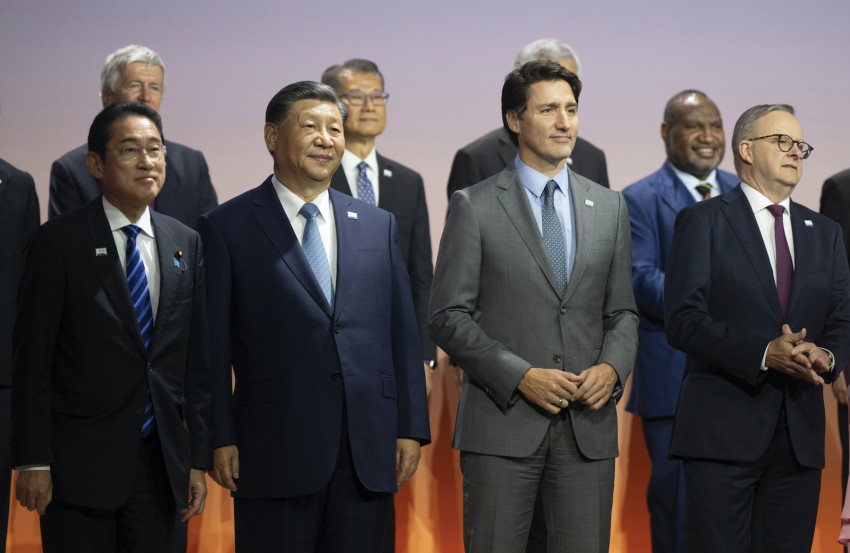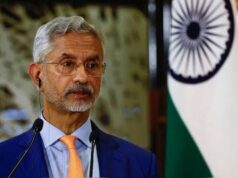Japan faces ‘friendshoring’ dilemma in Asia amid China risks

A growing sense of urgency to ensure economic security is precipitating the formation of like-minded groups in the Asia-Pacific, where the reengagement of the United States is met with China’s quest for greater influence.
The new paradigm is putting Japan’s diplomacy – and its ultimate vision for its own engagement in the region — to the test.
It is pushing for a rules-based, “free and open” Indo-Pacific, seen as a counterbalance to China, but it also needs to avoid alienating countries that are much closer to Beijing than to Tokyo and ruffling the feathers of the Asian powerhouse.
The delicate balancing act was evident when Japanese Prime Minister Fumio Kishida visited San Francisco for a summit of the Asia-Pacific Economic Cooperation forum that concluded Friday. He underscored the importance of allies and partners joining forces, and in particular, warming relations with South Korea as they both face China, an assertive neighbor but key trading partner.
At the summit of the Indo-Pacific Economic Partnership coinciding with APEC, Japan and 13 other nations reached agreement on all but one pillar of the U.S.-led trade initiative that does not include tariff cuts like free trade agreements, a key step toward what the United States terms “friendshoring,” or diversifying supply chains among like-minded partners.
“It’s a framework that is designed to protect the economic security of the United States, which will also benefit Japan and other nations,” said Junichi Sugawara, a principal at Owls Consulting Group. “But it’s not as if we are going to completely decouple from China so the question is how far friendshoring can go.”
Some experts see the momentum building for a more fragmented world in which states defend their own national interests, in a potential blow to multilateral, free trade arrangements.
As talks continued to complete as many pillars of the IPEF as possible, a Japanese government official said reducing reliance on a single nation for strategically critical items was a “good” course of action.
“That being said, it does not and should not mean that partners with similar views can also undermine the free trade system,” the official added.
Japan enjoyed the benefits of free trade during its high growth era with bilateral and multilateral agreements.
Even without the participation of the United States, Japan pushed for the conclusion of the Trans-Pacific Partnership agreement, while joining the Regional Comprehensive Economic Partnership, which also involves China, South Korea and the 10-member Association of Southeast Asian Nations.
APEC members also share the ambitious goal of creating an Asia-Pacific free trade area.
During the years of the COVID-19 pandemic, shortages of goods, notably chips, made some nations more inward-looking. “With supply chains disrupted and goods not coming in, people started looking at (the importance of) their own national borders,” Sugawara said.
Still, economic benefits are bringing countries closer like Japan and South Korea, which were until recently unlikely bedfellows due to differences over wartime labor compensation and other issues.
In a rare joint appearance with South Korean President Yoon Suk Yeol at a Stanford University event, Kishida spoke of the need for Japan, South Korea and the United States to jointly drive transformations.
“It’s natural that South Korea is getting closer to Japan and the United States because it has been taking a big hit from this U.S.-China rivalry,” said Toru Nishihama, chief economist at Dai-ichi Life Research Institute. “But this is happening under the conservative government and it could change if the leader changes.”
Trilateral cooperation between Japan, China and South Korea is also necessary given their economic interdependence but has become increasingly complex, especially with Tokyo and Seoul pushing for cutting reliance on China, or de-risking. Eyes are on whether the three nations will be able to hold their first summit in four years, with South Korea this year’s chair of the tripartite framework.
For Japan, ASEAN members are crucial for a loose coalition of partners to help make the region free and open without raising the ire of China. Brunei, Indonesia, Malaysia, Singapore, Thailand, the Philippines and Vietnam have joined IPEF.
Some others like Cambodia are closer to China than to the United States or Japan, and experts say forcing the ASEAN members to choose between the two camps will not work.
With China in mind, Japan has made it a point to call for a rules-based international order.
Mie Oba, a professor of international relations at Kanagawa University, said Japan needs to be more specific in its vision for the region, as in its recent plan for the creation of a zero-emission community in Asia.
“Be it IPEF or RCEP, countries in the region will use it if it benefits them,” Oba said. “The important point is how Japan will figure in the region and within multilateral arrangements over the longer term and that should be visible.”




